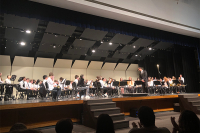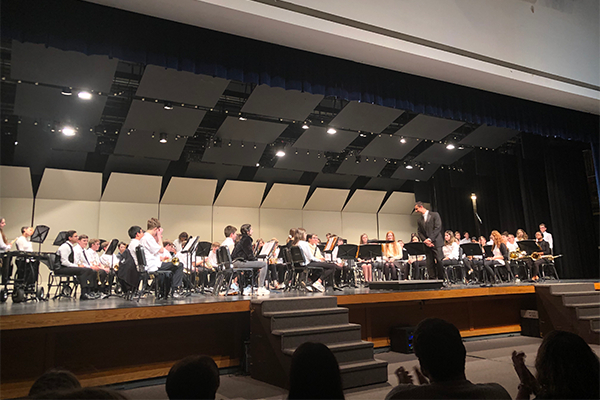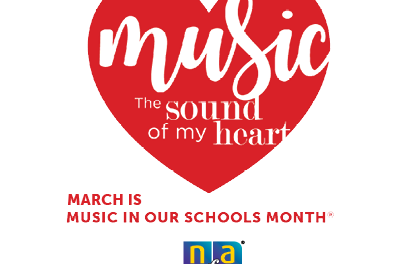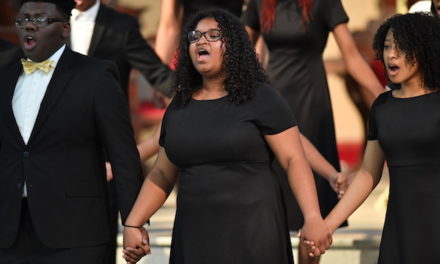
As a music educator, your focus is all about preparing your students for a performance. But imagine using those performances to strengthen ties with all of your stakeholders: students, parents, administrators, the school board, and your community. With a little preparation—a lot of which could be outsourced to parents and other volunteers—your performances could be the super glue that holds your program together.
Performances are the ultimate advocacy for your program!
As Dr. John Gallagher of the New York State School Music Association suggests,
“Perform, perform, perform. It’s what we do.
“The process over the product, though—however, the product being the performance, the concert, the special event—the process is what matters.
“Watching students rehearse, watching the young ones first pick up an instrument. Watch them try to understand this new foreign language, which literally it is. Music notes are just like letters, and you put different letters together, you have a word. You put different notes together, you have a measure. You put different measures together, you’ve got a whole piece of music—which is really a story.
“So what they’re doing is learning this foreign language. They have their kinesthetic movements now where they’re learning their fingerings, they’re learning bowing techniques. The physicality of it. They’re learning how to breathe, they’re learning what their trachea does. They’re learning how good posture promotes good breathing. So I think the best thing that we can do is perform.”
Engage your parents, administration, school board, and community—all at once!
Get them in the room where it happens.
There are people at every level whose decisions affect the success of your program: prospective students, parents, administrators, and school board members. Consider adding local media contacts to that list; they can magnify your message to those who aren’t able to attend in person. Imagine being able to give all of them a positive interaction with your program—at the same time and in the same place!
Your concerts and performances give all of them an opportunity to see the product of your classroom. It’s so much easier to support something you understand. Help them help you. Make sure that your stakeholders understand what you’re teaching and more importantly, WHY you’re teaching it. Check out this inspiration from conductor and composer Jack Stamp.
Your performances are a force for good in your community. Music brings people together, regardless of their differences in other areas. Giving your administrators and school board members access to that opportunity benefits not only your program, but the administrators and school board members, as well as your community. Find small things you can ask them for; it will pave the way for successful bigger asks down the road. Ask these administrators to write a letter of welcome for your program book. Invite them to attend, and perhaps your school board members, to speak from the stage in support of your program. Psychologically, it will cement in their minds, as well as the minds of your audience, the importance of music education in your community. If they’ve just told your audience how important music education is at your concert, it’ll be much more difficult to make the decision to defund music education at the next school board meeting.
With a bit of promotion, you can fill your auditorium with community members who are likely to vote the next time there’s a funding referendum for the school district. If they see your ensembles out in the community performing and delighting audiences, they’ll feel like their tax dollars are well spent, even if they don’t have a child in school. And don’t you think your elected school board members would love to have access to their voters, while supporting students at a heartwarming musical experience right in their own community?
Don’t just invite them to one performance, either; invite them to every performance at each level of your program! It’ll be easy for your stakeholders to see student progression if they attend elementary, middle school, AND high school performances: it’s practically like time-traveling!
Make your performance an informance!
Share programming choices and program notes with your audience. Explain what you expect students to learn from each piece. Let them know it’s not JUST about playing pretty music. You’ll earn bonus points for having your students write these blurbs and present them to your audience.
Take advantage of a captive audience
You know that parents will drop off students early for warm-ups. While they wait in the auditorium, give them something to do and something to consider while they wait.
In your program book, add advocacy materials rather than leaving parts of pages blank. Underneath the repertoire list, fill that space with The Three Brain Benefits of Musical Training, for example. We’ve collected a large selection from reputable sources here.
Deliver that same information another way! If your auditorium is equipped with a projector, show slides that demonstrate the power of music education If you feel like the messaging might be a bit too heavy-hitting, intersperse these slides with candid photos of your students. Mom, Dad, Grandma and Grandpa will be so busy watching for their students’ faces, they’ll hardly notice that they’ve learned something.
In addition, surrounded by the families of other music students, they’ll have social proof that they made a good decision when they encouraged their child to enroll in music. That auditorium may be the very room where families decide that perhaps it would be good if that student continued on to middle school and high school music. That decision may be made even easier if you have older students attend and participate in the performance. Make it easy to identify them by having them wear a tee shirt or jacket with the name of their ensemble.
Your performances are going to happen anyway. Don’t let another one slip by without juicing it for all its worth. Find ways you can slip in messages about the importance of music education to the decision-makers in your audience. As author Dan Pink writes, “To sell well is to convince someone else to part with resources—not to deprive that person, but to leave him better off in the end.” You’ll agree that selling your audience on music education leaves everyone better off in the end!




